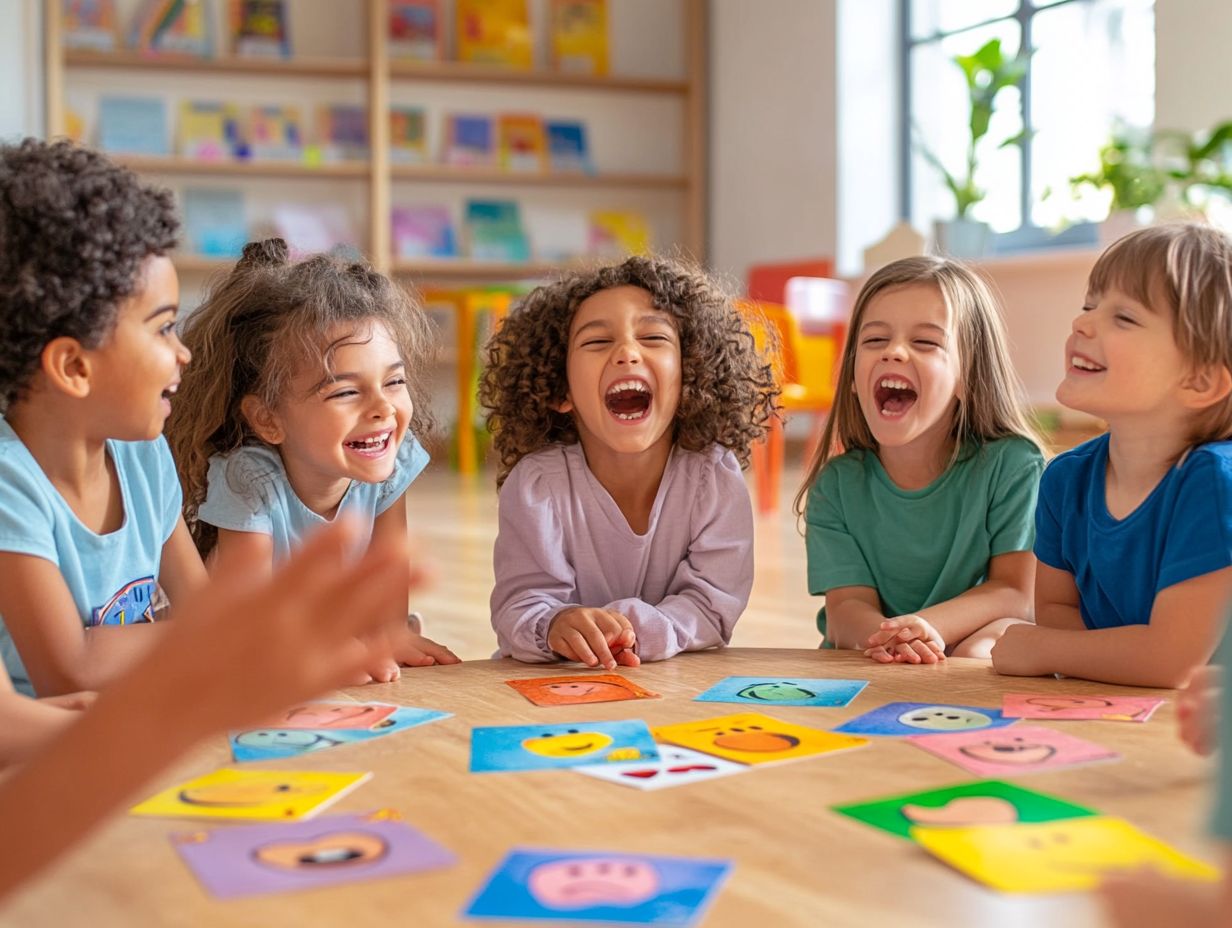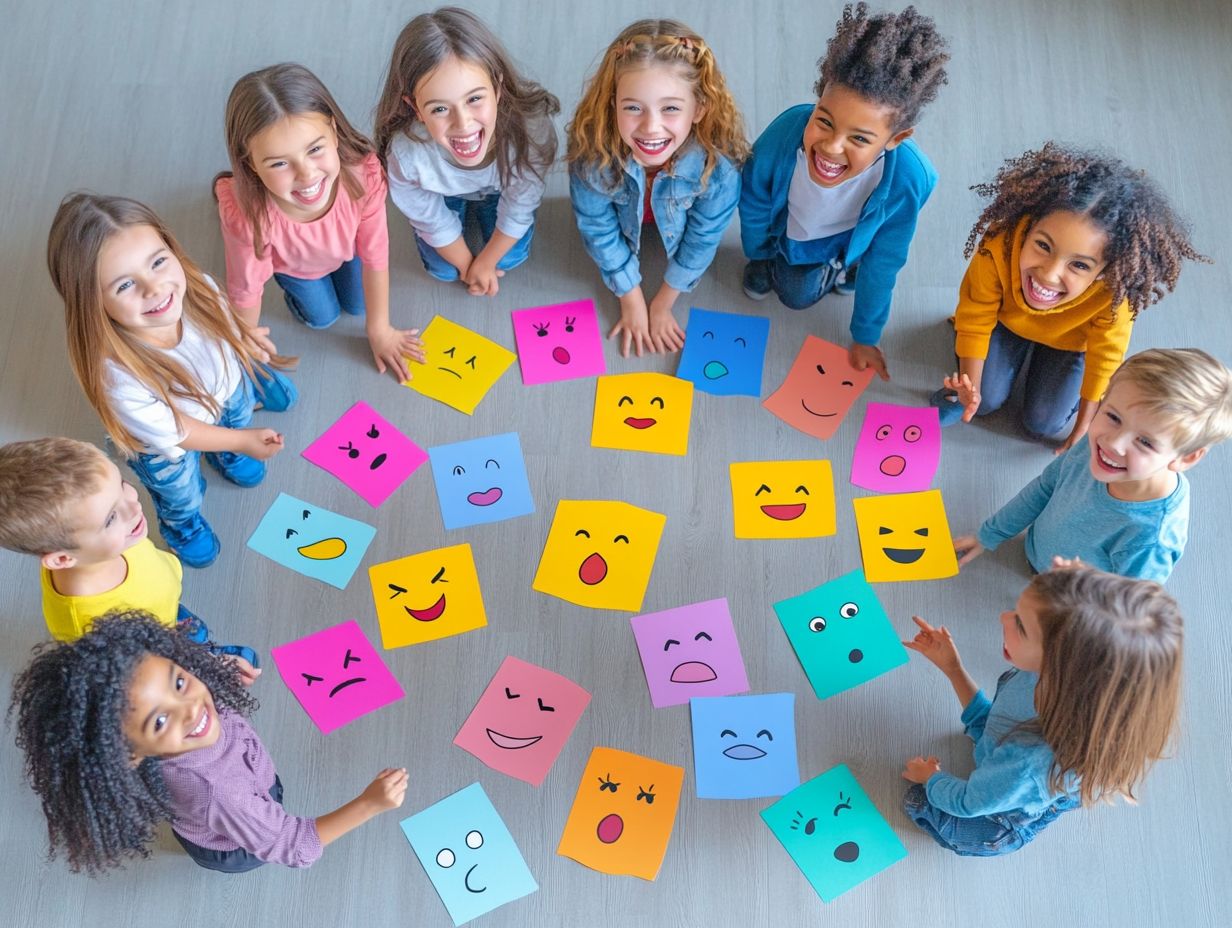Understanding Emotional Awareness in Neurodiverse Kids
Emotional awareness is essential for the development of neurodiverse children, enabling them to navigate their distinctive emotional experiences with greater ease. This includes recognizing emotions, understanding emotions, and managing emotions effectively.
This article delves into the concept of emotional awareness and highlights its particular importance for neurodiverse kids. It examines the common emotional challenges they encounter, such as a difficulty in identifying and describing emotions, and provides practical strategies for parents and educators to nurture emotional growth and support emotional development.
From teaching emotional vocabulary to managing sensory overload through coping mechanisms like relaxation exercises, you will uncover how enhancing emotional awareness can yield significant long-term benefits for neurodiverse children.
Contents
- Key Takeaways:
- What Is Emotional Awareness?
- Why Is Emotional Awareness Important for Neurodiverse Kids?
- How Can Parents and Educators Help Develop Emotional Awareness in Neurodiverse Kids?
- Using Visual Aids
- What Are Some Strategies for Managing Emotional Overload in Neurodiverse Kids?
- Mindfulness and Emotional Regulation for Neurodiverse Children
- How Can Emotional Awareness Benefit Neurodiverse Children in the Long Run?
- Frequently Asked Questions
- What does it mean to have emotional awareness in neurodiverse children?
- How can I help my neurodiverse child develop emotional awareness?
- What are some common challenges neurodiverse children face with emotional awareness?
- Are there any benefits to promoting emotional awareness in neurodiverse children?
- Can emotional awareness be improved in neurodiverse children?
- How can I support my neurodiverse child’s emotional awareness at school?
Key Takeaways:

- Understanding emotional awareness is crucial for supporting the emotional well-being and mental health of neurodiverse kids.
- Parents and educators can help develop emotional awareness in neurodiverse kids by teaching emotional vocabulary, encouraging self-expression through creative activities, and creating a safe and supportive environment.
- Strategies for managing emotional overload, such as mindfulness techniques, sensory breaks, and deep breathing exercises, can greatly benefit neurodiverse kids in the long run by addressing their emotional needs.
What Is Emotional Awareness?
Emotional awareness is your capacity to recognize and comprehend not only your own emotions but also those of others, a crucial component for effective communication and emotional intelligence. It involves the skills necessary to identify feelings, manage emotions, and adeptly navigate emotional responses in diverse situations.
This awareness is particularly significant in the emotional development of autistic children, as it assists them in regulating their emotional states and responding appropriately to social cues. By nurturing emotional awareness, neurodivergent learners can enhance their emotional regulation and significantly improve their overall well-being.
Why Is Emotional Awareness Important for Neurodiverse Kids?
Emotional awareness holds immense significance for neurodiverse children, especially those on the autism spectrum. It plays a vital role in their emotional well-being, communication skills, and ability to navigate social interactions with confidence. This is particularly crucial for addressing emotional challenges such as a difficulty in identifying and describing emotions.
By developing emotional awareness, these children can learn to recognize and understand their emotions, as well as manage their emotional responses and intensity. This skill is critical, given the distinct emotional challenges they often encounter.
By fostering emotional awareness, parents and educators can offer the essential support these children need to flourish in their daily interactions and improve their emotional regulation, enhancing their overall emotional intelligence.
What Are the Common Emotional Challenges Faced by Neurodiverse Kids?
Neurodiverse children, including those on the autism spectrum, often navigate a complex landscape of emotional challenges that can significantly impact their daily interactions and overall well-being. These include issues like a difficulty in identifying and describing emotions and challenges with body language.
These emotional hurdles may manifest as difficulties in recognizing their own feelings or understanding the emotions of those around them. This struggle can lead to misunderstandings in social contexts, where the subtleties of emotions and body language play a crucial role.
The intensity of their feelings can result in quick, sometimes disproportionate reactions to everyday situations, creating confusion for both themselves and those around them. Emotional regulation can be a significant barrier, often resulting in outbursts or withdrawal, which profoundly affects their social relationships and emotional development.
Recognizing and responding to physical sensations related to emotions can be challenging for them. To tackle these challenges, implementing supportive strategies is essential.
Approaches such as structured emotional education, using social stories, coping techniques like mindfulness, and creating safe spaces for expression can greatly enhance their emotional skills and foster healthier interactions.
How Can Parents and Educators Help Develop Emotional Awareness in Neurodiverse Kids?
You hold a pivotal role in nurturing emotional awareness in neurodiverse children by employing a range of supportive strategies that promote emotional recognition, emotional labeling, and expression.
By taking intentional steps, such as teaching emotional vocabulary, utilizing visual aids, and encouraging self-expression through creative activities, you can create an environment that fosters emotional growth and empathy development.
Furthermore, by cultivating emotional intelligence skills and offering emotional support strategies, you enable autistic children to not only manage their emotions but also recognize and navigate their emotional experiences effectively, ultimately improving their developmental outcomes.
1. Teaching Emotional Vocabulary

Teaching emotional vocabulary is crucial for helping neurodiverse children develop emotional awareness. It allows them to identify and articulate their feelings with greater effectiveness. By introducing a diverse range of emotional terms and guiding them in labeling their emotions, you enable these children to communicate their emotional states and navigate their feelings with enhanced clarity, leading to better emotional labeling.
This foundational skill not only boosts their emotional intelligence but also promotes better emotional regulation and emotional understanding.
Employing techniques like social stories can vividly illustrate various emotional experiences, providing relatable contexts that resonate with learners. Visual aids, such as emotion charts or flashcards, further reinforce these concepts in a visually engaging manner, making it simpler for children to reference and comprehend their feelings in real-time, thus aiding emotional recognition.
Using everyday examples from familiar situations fosters conversations about emotions and helps to alleviate feelings of overwhelm. When children can label their emotions, they gain increased self-awareness and are equipped with essential tools to express their feelings constructively. This ultimately nurtures better relationships, enhances social interactions, and improves empathy development.
2. Encouraging Self-Expression
Encouraging self-expression is essential for neurodiverse children, as it enables them to convey their emotions and experiences in a comfortable and meaningful manner. Through creative activities like art, music, and writing, they can delve into their feelings and express themselves without the limitations of verbal communication. This not only promotes emotional expression but also aids in navigating emotional challenges, enhancing their overall emotional awareness and emotional understanding.
By providing opportunities tailored to their unique interests and strengths, you can create an environment where creativity serves as a safe outlet. For instance, incorporating music therapy or sensory-friendly art projects can foster deeper engagement, making emotional exploration feel less overwhelming. Personalizing activities such as storytelling or dance enables them to share their distinctive perspectives, boosting their self-confidence and enhancing social connections with peers. Additionally, these creative activities can help them recognize and manage strong emotions more effectively.
Ultimately, these practices cultivate emotional intelligence, equipping children with invaluable coping mechanisms for managing intense feelings. This approach lays a solid foundation for resilience and personal growth by enhancing their ability to handle emotional intensity.
Using Visual Aids
3. Using Visual Aids
Utilizing visual aids is an effective strategy for enhancing emotional awareness and recognition in neurodiverse children. These tools simplify complex emotional concepts. With resources like emotion charts, flashcards, and illustrated social stories, you can provide clear representations of various emotions. This helps them identify their feelings while understanding the associated physical sensations and emotional responses.
These aids help bridge the gap between understanding and expressing emotions. They also support emotional recognition.
Incorporating tools like emotion wheels and video modeling can further facilitate emotional learning by encouraging engagement and interaction. For instance, an emotion wheel allows children to explore a spectrum of feelings, promoting a deeper understanding of shades of feelings alongside their own emotional experiences, including the subtleties of emotional reactions.
In practical scenarios, you can seamlessly integrate these visual supports into daily routines. Using flashcards during family discussions or role-playing scenarios can effectively reinforce emotional vocabulary and recognition. Ultimately, these visual aids not only assist in identifying emotions but also play a crucial role in fostering emotional regulation. They help children articulate their feelings and respond to them in healthy ways. This method also supports empathy development and improves communication skills.
4. Creating a Safe and Supportive Environment
Creating a safe and supportive environment is essential for fostering emotional awareness and development in neurodiverse children. Imagine a space where emotions are celebrated! This nurturing atmosphere cultivates trust and encourages open expression of emotions. When children feel secure in their surroundings, you, as a parent or educator, can inspire them to explore and express their feelings without the fear of judgment.
Such a supportive environment addresses their emotional needs, facilitating healthy emotional responses that enhance their emotional regulation and coping mechanisms. This is particularly important for highly sensitive children who may need additional empathy and support.
To achieve this, consistency is paramount. Establishing predictable routines allows children to know what to expect, reducing anxiety and instilling a sense of safety. By actively listening and observing each child’s unique emotional needs, you can tailor your responses and support to meet them effectively, ensuring they feel understood and supported in their daily interactions.
Creating opportunities for open discussions about feelings whether through storytelling, art, or play promotes emotional literacy and validation. Encouraging practices like deep breathing exercises or mindfulness activities exercises that help children focus on the present moment enables children to manage their emotions with confidence. By implementing these strategies, you can cultivate spaces where emotional expression is not only accepted but celebrated.
What Are Some Strategies for Managing Emotional Overload in Neurodiverse Kids?
Managing emotional overload in neurodiverse children calls for effective strategies that foster emotional regulation and equip them to navigate overwhelming situations. Techniques like mindfulness practices, relaxation exercises, and sensory breaks can provide these children with the tools they need to handle emotional intensity and regain control over their responses.
Not only do these strategies assist in managing strong emotions, but they also enhance their overall emotional awareness and well-being.
Act now to equip your child with the skills they need!
Mindfulness and Emotional Regulation for Neurodiverse Children
1. Mindfulness Techniques

Mindfulness techniques serve as invaluable tools for helping neurodiverse children manage emotional overload and enhance their emotional regulation. By incorporating practices such as mindful breathing, guided imagery, and body awareness exercises, you can help them cultivate a sense of calm and focus.
These relaxation exercises promote emotional awareness while equipping them with coping mechanisms for navigating strong emotions and sensory stimuli in their surroundings. Imagine a world where your child feels in control and calm, ready to take on daily challenges!
You can seamlessly integrate these techniques into a child s daily routine, providing consistent opportunities for growth and improvement. For example, mindful breathing can be introduced during transitions, such as moving from playtime to homework, making it a natural and effortless part of their day.
Guided imagery can come into play during moments of heightened anxiety, allowing the child to visualize a safe haven that helps alleviate stress. Incorporating body awareness activities like simple stretches or yoga into morning routines can significantly enhance their focus and prepare them for the day ahead.
By nurturing these habits, children not only develop better emotional control but also foster resilience, paving the way for improved interactions and overall well-being.
2. Sensory Breaks
Sensory breaks are vital for neurodiverse children who often face emotional overload due to strong reactions to sounds, lights, and textures. By offering them opportunities for sensory regulation whether through quiet time, physical activities, or calming sensory tasks you enable them to manage their emotional responses and regain their composure.
These breaks are essential in supporting emotional regulation and fostering greater emotional awareness. Incorporating sensory breaks into their daily routines establishes a sense of stability and predictability, which is particularly advantageous for neurodiverse children.
As a caregiver or educator, it s crucial to recognize the signs that a child may need a break, such as increased anxiety, restlessness, or frustration. Creating a designated sensory space filled with calming items like fidget toys small items that help relieve stress, weighted blankets, or soft lighting can offer a comforting environment for them.
Activities such as deep-breathing exercises, gentle stretches, or listening to soothing music can also prove effective. By intentionally planning these breaks, you can enable children to better navigate their emotions and enhance their overall well-being.
3. Deep Breathing Exercises
Deep breathing exercises offer a simple yet powerful way for neurodiverse kids to manage their emotions and improve emotional regulation. By guiding them to focus on their breath and practice controlled breathing techniques, you can help them lower their stress levels and enhance their emotional well-being.
These relaxation exercises can seamlessly fit into daily routines or be employed during moments of emotional overload. Such techniques encourage mindfulness and equip children with the tools they need to calm themselves when feeling overwhelmed.
Implementing these exercises can be as straightforward as dedicating a few quiet minutes each day or incorporating them into specific activities like reading or after playtime. The benefits extend far beyond immediate emotional relief; adopting deep breathing nurtures a greater sense of self-awareness.
This helps neurodiverse individuals recognize and articulate their feelings with greater clarity. By making these exercises a regular practice, they can establish a strong foundation for emotional health, enhancing their ability to navigate life s challenges with resilience.
How Can Emotional Awareness Benefit Neurodiverse Children in the Long Run?
The long-term benefits of cultivating emotional awareness in neurodiverse children reach well beyond immediate emotional management. They encompass essential life skills, including enhanced communication and emotional intelligence.
By nurturing emotional awareness from an early age, these children learn to recognize and understand their emotions, as well as manage their emotional responses. This foundational skill set can profoundly enrich their social interactions and relationships throughout their lives.
As they mature, these abilities will play a crucial role in their emotional well-being and resilience when confronting life’s challenges.
Frequently Asked Questions
What does it mean to have emotional awareness in neurodiverse children?

Emotional awareness refers to the ability to recognize, understand, and manage one’s own emotions as well as the emotions of others. In neurodiverse children, this can be more challenging due to differences in brain function and processing.
How can I help my neurodiverse child develop emotional awareness?
Some ways to help neurodiverse children develop emotional awareness include using visual aids and practicing emotional regulation techniques. Providing a safe and supportive environment for open communication about emotions is also key.
What are some common challenges neurodiverse children face with emotional awareness?
Common challenges may include difficulty recognizing body language and expressing emotions appropriately. They may also have trouble identifying their own emotions and finding effective ways to cope with them.
Are there any benefits to promoting emotional awareness in neurodiverse children?
Absolutely! Promoting emotional awareness boosts self-esteem and opens doors to better relationships and overall happiness. It can significantly help reduce meltdowns and behavioral issues that may arise from not understanding or managing emotions effectively.
Can emotional awareness be improved in neurodiverse children?
Yes! With patience, understanding, and targeted strategies, emotional awareness can be improved in neurodiverse children. It may take time and effort, but with consistent support and practice, they can develop a better understanding and control of their emotions.
How can I support my neurodiverse child’s emotional awareness at school?
Communication with teachers and school staff is key. Providing them with information about your child’s specific needs and strategies that have been effective can help create a supportive environment for emotional awareness to flourish.
Encouraging open communication between your child and their peers can also be beneficial.






